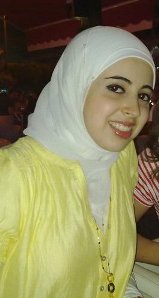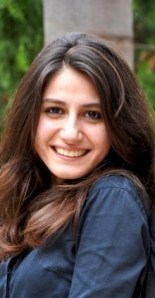Angi Ghanem and Layla Kabalan, LAU Fulbright Scholars


LAU senior, Angi Ghanem, and recent LAU graduate, Layla Kabalan are two of only four students chosen from LAU this year to receive the prestigious Fulbright Scholarship, one of the most widely recognized and prestigious international exchange programs in the world. Fulbright selects individuals with strong records of achievement and leadership potential who represent the full diversity of their respective societies. And in the case of the LAU recipients, all were active participants in LAU’s Model United Nations Program.
As Fulbright scholars, both Angi and Layla will be heading to the United States soon to pursue graduate degrees. We caught up with them to learn a little more about what receiving the scholarship means to them and their plans for the future.
The Fulbright Scholarship Program selects candidates for their leadership potential as well as academic merit. What experiences have you had at LAU or activities have you participated in that have contributed to your leadership qualities?
Layla: LAU has played a major role in preparing me. First of all, LAU hosts the only Global Classrooms accredited program in the Middle East. By becoming a trainer in this program, I have gained solid experience in terms of world politics and hands on diplomacy. On the other hand, the professors at the Political Science department have made a great effort in turning their classrooms into critical thinking tanks. I believe that the discussions that were held in those classrooms fostered my character greatly. Moreover, LAU has always made the effort to expose us to activities outside campus ranging from election monitoring in 2009 to WorldMUN conferences in Taiwain to a semester exchange in Paris. All those experiences have shaped my understanding of what it is like to be a "world citizen" which is a trait much-needed to be a leader in today’s diverse world.
Angi: It’s correct that the Fulbright Scholarship Program selected candidates based on our academic merit as a first stage, but this was complemented with the overall profile we have. The profile that the Fulbright Committee seeks to find during the interviews, was a profile that reflects leadership, success and variety of the candidate’s activities as well as the candidate’s future potential to lead projects benefiting his society.
In my case, leadership has been first shown through the variety of activities I participated in and second, through the project that I represented in my statement of purpose and that I explained during my interview.
Being a former scout with a batch of "Responsibility" was the first notable sign telling my surroundings and myself, that I could handle issues in a more mature way than my peers. Starting here, I was always leader of the groups I am involved in. To me, a leader is the one who seeks perfection while holding to the respect and gratitude to others. Hence, this love of perfection impacted my academic records and my volunteering skills. Nevertheless, LAU gave me a lot of opportunities to prove this quality. Having the chance to be part of several clubs, like IEEE and MUN; introducing us to the events taking place in Lebanon like the Francophone games for us to volunteer in, and including a lot of projects through our courses, were all things that enhanced my leadership potential and social connection.
How do you feel LAU has prepared you for your post-graduate studies that you will be pursuing abroad?
Layla: LAU has played a major role in preparing me for post-graduate studies through continuous seminars by graduate schools as well as through the guidance of the faculty. I mean, all our faculty have either taught at or received their degrees from universities abroad which makes the advice they give much more concrete and personal.
Angi: LAU has first prepared me to integrate into a lot of different activities that represent different aspects of our real life. In LAU, the wide variety of people from different places in Lebanon and other countries was a very helpful, preparatory factor in facing the large communities abroad.
In addition to this social preparation, LAU professors have helped me form a clearer understanding of the life and post-graduate studies abroad while offering me a lot of wise advice, for which I am really thankful. Not to forget the fact, that education in LAU shares many similarities to U.S. courses, especially now that we are ABET accredited. So, I am sure now that my courses have prepared me very well for my next studies.
What do you plan to use your scholarship to study?
Layla: I plan on studying International Development which brings together my two passions (economics and politics). I am really interested in the politics and economies of the developing world and see that there is a huge potential that is going to waste in this part of the world. Thus, I find myself best in that field.
Angi: I plan to use the Fulbright Scholarship to study Biomedical Engineering with a focus on Biomedical Devices. In fact, the committee has chosen the finalists based on several things, one of which is their post-graduate specialization.
After I earn my Master’s degree, I hope to pursue a PhD. which will enable me to share my knowledge in universities as well as to start a maintenance, design, and manufacturing biomedical center in Lebanon. U.S. studies will certainly offer a great opportunity in applying theories to real life issues and in seeking the market needs.
The Fulbright program is ‘designed to increase mutual understanding between the people of the United States and the people of other countries.’ In what ways do you hope to increase that mutual understanding?
Layla: Mutual understanding has been one of those "hot media topics" especially after the 9/11 attacks. I feel that mutual understanding is not as hard of a task as media outlets portray. There is no such thing as "clash of civilizations" between the people. I am not saying that prejudgments and misconceptions do not exist but at their essence they are just "misunderstandings" that can be changed. And as a matter of fact, change starts on a personal level and develops into a large scale one. Thus, by representing who I am, and having a diplomatic character, people are going to directly link me to my country. And this is how I see that I will be playing a role in the "mutual understanding" process, I do not need to carry my flag around and do presentations about Lebanon 24/7, all I have to do is portray truly how a Lebanese is and that would change the perception of all those I get in contact with.
Angi: The Fulbright program will certainly make my duration in the U.S. an experience to benefit from! This program will give me the chance to get involved in a new, foreign culture, get to know their traditions and get them to know mine, try to understand their way of living, their thoughts and aims, and try to make them understand the values and traditions the Lebanese and Arab people adopt, and try to reflect the best picture of what Lebanese and Arabs really are. I think programs such as Fulbright are the best in terms of increasing the mutual understanding between different societies and different traditions, it is a chance to merge thoughts in a way that will gradually (and hopefully) lead to more peaceful environments.
Great Thanks go to my family in the first place, my friends and of course to my LAU professors!"
Latest posts:
- Live Chat with Manal El Tayar on studying at Sciences Po in France
- Live Chat with Salma Abdelnour, author of Jasmine and Fire
- LAU Facebook Cover Photos
- The Appointment of a New Provost
- Dr. Hussein Abbas and Dr. Ahmad Houri, co-authors of the Student’s Guide to Graduate Studies
- Live Chat with LAU President, Dr. Joseph Jabbra
- Prof. Fuad Hashwa and the MEDASTAR Program
- Live Chat with Dr. Mona Haidar on Social Medicine at LAU
- Live chat with Assistant Vice President for Enrollment Management Abdo G. Ghié
- Live Chat with LAU’s Vice President for University Advancement Mr. Richard Rumsey on social media at LAU
- More
Join us on Facebook:


 News and information
News and information Follow us on Twitter
Follow us on Twitter